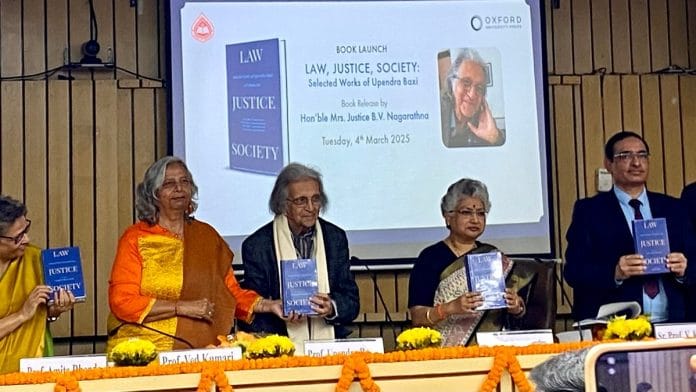New Delhi: Public Interest Litigations were once a tool for citizens to hold the state accountable. Now, they are increasingly misused for personal grievances, political agendas, and frivolous petitions, said Justice BV Nagarathna, who is poised to become India’s first woman Chief Justice in 2027.
“PILs used to be a virtuous weapon in the hands of the weak, but it is now losing its virtuousness,” Nagarathna said on Tuesday during the launch of Law, Justice, Society: Selected Works of Upendra Baxi, organised by the Oxford University Press at the Indian Law Institute, New Delhi. “Now it’s either Paisa Interest Litigation, Publicity Interest Litigation, or Private Interest Litigation, but where is the real PIL?”
Around 150 judges, lawyers, Bar Council members, law faculty, and scholars attended the event, with Supreme Court Justices Prasanna B. Varale and N. Kotiswar Singh, along with former Himachal Pradesh High Court Chief Justice Rajiv Shakdher, among those present. Also in the audience was 86-year-old Upendra Baxi himself, one of India’s most influential legal scholars, a human rights activist, and a Padma Shri awardee.
Nagarathna had a suggestion for him.
“Professor Upendra Baxi has rightly termed PIL as social activism litigation, but I think now is the time for him to think and write about the misuse of PILs,” she said. “A powerful weapon for ameliorating injustice has been reduced to being viewed with suspicion, owing to the actions of a few.”
When Baxi took the mic, he briefly reflected on the judiciary, remarking that there are very “few judges who do justice”, before praising Nagarathna’s dissent in the Supreme Court’s demonetisation verdict. She had described demonetisation as “well-intentioned” but unlawful.
“Law is made by Parliament, but it speaks for the nation,” Baxi said. Then, quoting MK Gandhi, he added, “Law is nothing but the convenience of the powerful.”
Also Read: Marathi anthropologist Irawati Karve disproved Nazi eugenics theory
A ‘provocative’ scholar
Few legal scholars have shaped India’s judiciary as profoundly as Upendra Baxi. Over five decades, his writings have not only influenced legal thought but guided judges who have risen to the highest ranks.
“Professor Baxi witnessed the evolution of our democracy and the Indian legal system, and over four to five generations of judges have been taught by him, including several Supreme Court judges,” said Justice Nagarathna, calling it a “privilege” and a “formidable responsibility” to speak about the great teacher and scholar’s legacy.
Baxi, now an emeritus professor of law at the Universities of Warwick and Delhi, has also served as vice-chancellor of the University of Delhi from 1990 to 1994 and South Gujarat University from 1982 to 1985. In 2011, he was awarded the Padma Shri.
Among the other panelists who spoke about Baxi’s contributions were Amita Dhanda, Professor Emerita at NALSAR University of Law, Hyderabad; Arun K. Thiruvengadam, Professor of Law at the National Law School of India University, Bengaluru; and VK Ahuja, Senior Professor at the Faculty of Law, University of Delhi.
Baxi’s events have a habit of drawing larger crowds than expected. This time, organisers kept the invite list tight, but the room was still filled to capacity.
In a lighter moment, Professor Ahuja recalled how he was “scolded” twice by Baxi at an event where a 200-seat hall had overflowed with more than 350 people.
“[Baxi] said, ‘When you know there will be so much audience, why did you conduct it here?’” he said, adding that the second telling-off came when the sound system malfunctioned.
On Baxi’s writings, Ahuja described them as being more than just provocative at times.
“Sometimes one is just shocked, not just provoked, but shocked, because he forces you to question your convictions and your beliefs about things,” Ahuja added.
Also Read: Sardar Patel transformed ‘steal frame’ to steel frame. IAS officers must revisit his legacy
Law beyond the classroom
Legal minds agree that for Upendra Baxi, law has never been an abstract discipline—it is a living, breathing force that must engage with power, governance, and society.
“The foundational premise of his writings and teachings is that law cannot be viewed in isolation, detached from its broader social, political, and economic contexts,” Justice Nagarathna said. She noted that Baxi understood the limits of legal studies as a purely doctrinal discipline and insisted on treating law as something that intersects with real-world struggles for justice and human rights.
Calling Baxi an “unparalleled source of knowledge, wisdom, and perspective,” she pointed to his critique of Indian academic lawyers who confine themselves to appellate or higher courts, while ignoring the reality of justice for ordinary citizens navigating district and civil courts.
His scholarship, she said, is a powerful reminder that constitutionalism is about the lived experiences of people, their struggles for justice, and their ever-evolving quest for a more equitable and democratic society.
“When we think of the Preamble, the words, and the values of our Constitution, we cannot divorce it from the struggles of Indian independence and the period prior to that. The background to the precious values of the Constitution must be borne in mind, rather than divorcing it from the past history,” she added.
Baxi himself has argued that India’s Constitution rests on four sovereign virtues—governance, rights, social development, and justice. Nagarathna called these its “eternal values”. Legal scholarship, to him, was not just an academic exercise in abstraction but an instrument for change.
“He was our dean at the law faculty of Delhi University. His contributions to the legal field extend far beyond academic theorisation and scholarly reflections of the legal system. They also exemplify a demonstration to social justice,” Nagarathna said.
Ahuja too spoke about Baxi’s grounded approach to legal education.
“Somewhere in his early writings, he had spoken about law teachers requiring to be like [traders] delivering their wares on a soapbox in Chandni Chowk,” Ahuja said. “To say, you must do legal education in a manner that it’s relevant for the world at large.”
(Edited by Asavari Singh)






